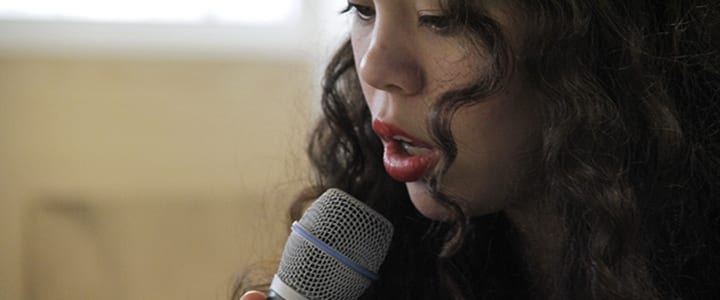 If you’re wondering how to sing well without lessons, you’ll want to check out this guest post. Here, Washington, DC voice teacher Jacqueline E. shares her thoughts…
If you’re wondering how to sing well without lessons, you’ll want to check out this guest post. Here, Washington, DC voice teacher Jacqueline E. shares her thoughts…
Is it possible to sing well without taking voice lessons? In a nutshell, my answer to this is a firm “no.”
So, what does it look like for someone who genuinely wants to learn how to sing well, but can’t take lessons, for whatever reason, and just commits to self-teaching through various methods? The different opportunities to learn how to sing well, then, are observing famous singers in each genre on YouTube or in concerts, listening to recordings, and reading books/articles on vocal pedagogy.
While all of these can be great tools, I’d like to address the problems associated with self-teaching in singing.
Understanding Your Voice
First, when a student watches a good singer, there are so many things about that singer’s body to observe: the jaw, mouth, lips, cheeks, neck/throat, chest, shoulders, abdominal area, etc. But the voice is not an instrument that you can see. The vocal cords and the other parts of the internal vocal mechanism demand an experienced, knowledgeable teacher who can give you immediate feedback based on what he or she hears about the sound you produce in relation to what physical sensations you experience when you sing.
Developing Your Unique Sound
If you learn how to sing by imitating what you hear, no matter how good your ears are, you will most likely end up sounding like the singers you listen to — not yourself. Furthermore, because of the structure of our skeletons and heads, we cannot hear ourselves the way others hear us, which is again another reason to have another set of ears assess your singing. A good voice teacher will bring out YOUR authentic voice, which is beautifully unrepeatable.
Correcting Bad Vocal Habits
Books on vocal pedagogy can certainly be helpful if you want to go in depth about the vocal mechanism. Listening to good singers is a great habit to get in to. But then, how will you know if you are picking up the correct vocal habits? What if you ingrain bad vocal habits over a long period of time? If you have never had lessons at all, you cannot know by yourself if something you watch or hear a singer do is going to be the right way to sing for YOU or if the way that “famous singer” is singing is actually the healthiest way to sing. (One should not equate “fame” with “sings in the healthiest way.”)
Developing Correct Vocal Habits
By all means, I do support the use of YouTube and vocal pedagogy books to help you discover the truth on what healthy singing is (and by contrast, what unhealthy singing is), but ultimately, it cannot be the only route you take. If you gather and synthesize all of this information by yourself, you will direct yourself toward developing bad habits because a live person did not give you feedback. Neither a book nor the Internet can teach you how to identify certain physical sensations while singing (because singing is more about feeling and less about listening), how to develop strong, healthy technical habits, and how to help you get rid of bad ones. A good teacher can.
When you do find a good teacher, my advice is to make sure that person is an accomplished singer who knows not only how to sing, but also how to teach about the vocal mechanism. Being accomplished means having had a lot of professional performing experience (not paying to perform) and if that teacher is old enough, even having students who have had a lot of success. Knowing how to teach means showing you they have a deep understanding of how the vocal mechanism works and can give you a clear cognitive and physical understanding of your instrument.
Vocal technique is inherited from a teacher and develops over long-term study. In short, if you’re wondering how to sing well without lessons, consider this advice. If you truly want to be a good singer with healthy habits, I highly recommend working with a singing teacher — and not just any teacher, but one with good ears and who meets your individual needs!
 Jacqueline E. teaches singing, music performance, and music theory in Washington, DC. She is a classically trained lyric-coloratura soprano, currently working on her Bachelor of Music degree in General-Choral Music Education from The Catholic University of America in Washington, DC in May 2015. Learn more about Jacqueline here!
Jacqueline E. teaches singing, music performance, and music theory in Washington, DC. She is a classically trained lyric-coloratura soprano, currently working on her Bachelor of Music degree in General-Choral Music Education from The Catholic University of America in Washington, DC in May 2015. Learn more about Jacqueline here!
Photo by Berklee Valencia Campus
Suzy S.
